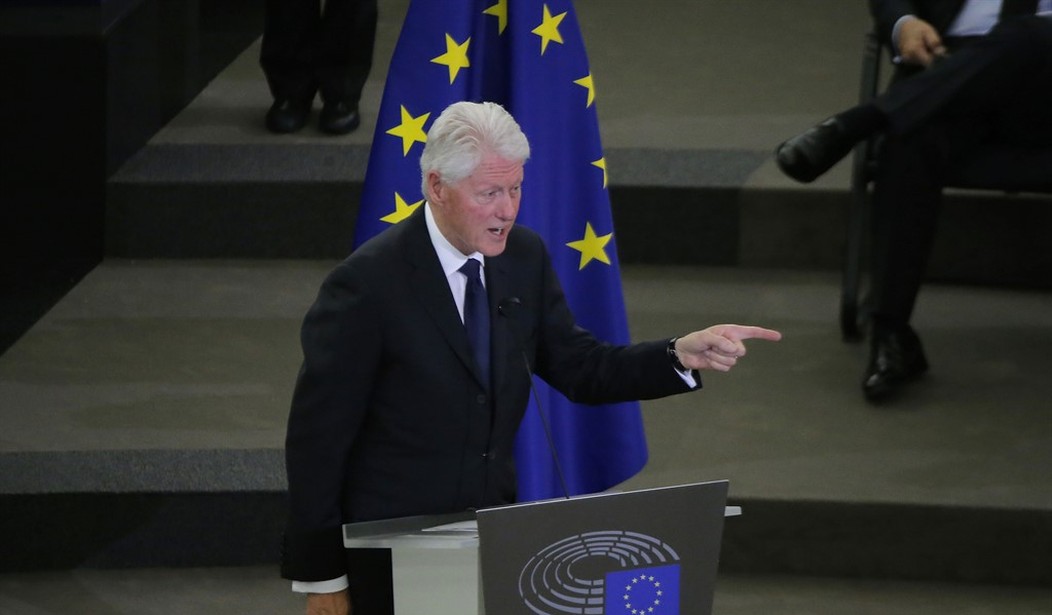During President Bill Clinton's 1996 campaign for re-election, several individuals allegedly worked on behalf of the Chinese government to influence the presidential election in favor of Clinton.
"Chinagate" began when the Los Angeles Times reported, a couple months before the '96 election, the following:
"The Democratic National Committee has returned a $250,000 contribution from a recently established subsidiary of a South Korean electronics company because it violated a ban on donations from foreign nationals in U.S. elections, a party spokesman said Friday. ...
"David Eichenbaum, DNC communications director ... said that the DNC fund-raiser who was responsible for the contribution was under the impression, erroneously as it turned out, that it fulfilled the legal qualifications. He said it was unclear whether the fund-raiser was misled or there had been a misunderstanding."
DNC did the standard "Oops, we made a boo-boo, here's your money back, it's all OK now" dog and pony show. That worked for a while. But a few months later, on Feb. 13, 1997, The Washington Post's Bob Woodward and Brian Duffy reported:
"A Justice Department investigation into improper political fund-raising activities has uncovered evidence that representatives of the People's Republic of China sought to direct contributions from foreign sources to the Democratic National Committee before the 1996 presidential campaign, officials familiar with the inquiry said. ...
"The Chinese effort to win influence with the Clinton administration can be traced to 1993, one source said. ... Some investigators suspected a Chinese connection to the current fund-raising scandal because several DNC contributors and major fund-raisers had ties to Beijing. Last February, Charles Yah Lin Trie, a fund-raiser for the Democratic National Committee, used his influence with party officials to bring Wang Jun, head of a weapons trading company owned by the Chinese military, to a White House coffee with Clinton.
Recommended
"Wang also heads a prominent, state-owned investment conglomerate. Clinton has since said he should not have met with Wang, and $640,000 in checks that Trie delivered to president's legal defense fund has been returned because of questions about the source of the funds."
The DNC vice chairman and fundraiser at the center of the DNC's illegal contribution was formerly a top executive involved with Asian and Chinese corporations, with some holdings sold to the Chinese government. Before joining the DNC, he left his corporate job with a large severance and worked at the Commerce Department for 18 months, where he enjoyed a top-secret clearance. Evidence showed more than 70 calls from his Commerce office to a bank controlled by his former corporation; memos of calls from Chinese embassy officials; three meetings scheduled with Chinese government officials; a breakfast and a dinner at the Chinese embassy; and at least one visit to the "residence of the Chinese ambassador."
After a year of investigation, FBI director Louis Freeh sent Clinton Attorney General Janet Reno a 22-page memorandum, stating, "It is difficult to imagine a more compelling situation for appointing an independent counsel."
Several months later, Charles LaBella, head of the Justice Department's campaign-finance task force, also sent a report to Reno recommending she appoint an independent counsel. The evidence, LaBella said, "suggests a level of knowledge within the White House -- including the president's and first lady's offices -- concerning the injection of foreign funds into the reelection effort." He also said, "If these allegations involved anyone other than the president, vice president, senior White House or DNC and Clinton/Gore '96 officials, an appropriate investigation would have commenced months ago without hesitation."
Reno, however, declined all requests for an independent counsel.
Before Chinagate, Sen. Ted Kennedy, thinking of running for president in 1988, reportedly offered to help the Soviets influence the 1984 election. Desperate to stop President Ronald Reagan's re-election, Kennedy, as first reported in The London Times in 1992, reached out via an intermediary to the Soviet KGB.
The London Times revealed a 1983 KGB document from KGB chief Viktor Chebrikov to the then-leader of the USSR, Yuri Andropov. Chebrikov relayed an offer presented to the Soviet leaders from Kennedy, delivered in person by "Sen. Edward Kennedy's close friend and trusted confidant" John Tunney, a former Democratic senator who was Kennedy's law school roommate.
Kennedy, according to the memo, offered to help the Soviets deal with Reagan, whom Kennedy perceived as a warmonger. Kennedy would "arm Soviet officials with explanations regarding problems of nuclear disarmament so they may be better prepared and more convincing during appearances in the USA." In exchange, Kennedy wanted Soviet aid in challenging Reagan's re-election. Kennedy offered to use his influential friends in liberal American media to arrange television interviews for Andropov. This would soften the Soviets' image, Kennedy suggested, and help brand Reagan as reckless and dangerous.
The memo said, "Kennedy does not discount that during the 1984 campaign, the Democratic Party may officially turn to him to lead the fight against the Republicans and elect their candidate president."
To summarize, there was no special prosecutor for Chinagate. And few in the media followed up on the Kennedy/KGB story when it broke. This explains why Trump supporters, despite the selective hyperventilation over Russian "collusion," still back their man.
























Join the conversation as a VIP Member